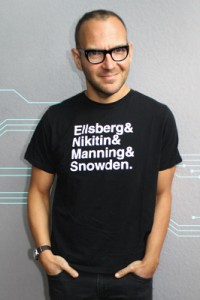Cory Doctorow: Proprietary Interest
 Last week, I found myself wide awake in bed next to my wife, mulling over an e-mail I’d gotten just before lying down (checking e-mail before bed being as bad a habit as eating before bed – both of which I’m trying to stop doing).
Last week, I found myself wide awake in bed next to my wife, mulling over an e-mail I’d gotten just before lying down (checking e-mail before bed being as bad a habit as eating before bed – both of which I’m trying to stop doing).
The e-mail came from a very nice person who co-curates one of my favorite internet resources: a LiveJournal group devoted to scanning, posting and discussing old advertisements, mostly print ads, though there’s the occasional YouTube embed showing an old TV or radio ad. Ads are funny things, a real window into the zeitgeist. SF writers have long understood the trick of placing some well-chosen ads in scene as a way of showing the reader what kind of world she’s following us into (this goes double for SF film-makers).
But for the longest time, adverts were considered unworthy of preservation. In the pre-1976 era in which US copyright law required formal registration for copyright, it was unheard-of for companies to register advertisements and deposit archival copies with the Library of Congress, which housed all registered works. In many cases, advertisements were omitted from microfilm/microfiche preservation in order to save money. But any time I’ve happened upon some paleo-magazine, I inevitably find the ads far more interesting, timeless, and provocative than the articles they ran alongside of.
So these amateur archivists are doing wonderful work, spelunking in mountains of thrifted and hoarded print sources for the weirdest, funniest, most charming ads of yesteryear and sharing them with each other and the world. I’m routinely moved to copy these ads to the blog I co-edit, Boing Boing, often with some snappy commentary, and always with a link back to the source, which is considered foundational good manners in blogdom.
Which is how I came to be mulling over an e-mail in bed. It came from one of the group’s moderators, and she wasn’t pleased with me. She’d gotten the mistaken impression that I had been putting the ads on Boing Boing without crediting their source, and wanted me to improve my behavior. She asked me how I’d feel if I someone took my work without credit, and suggested that I might even consider asking permission from the original posters before I took their scans for my own.
(Before I go further, let me state for the record that this was all a minor misunderstanding that was quickly and amicably and reasonably resolved, and that I have nothing but good will and good wishes for the Vintage Ads group and its hardworking moderators and participants.)
This note had me thoroughly bemused and somewhat befuddled. Manners are all well and good, but the note seemed to miss an important fact: it was advocating a standard that, if applied evenly, would lead to the extinction of the group itself.
By and large, the ads in this marvelous community are in the public domain. This means that they are not copyrighted, cannot be copyrighted, and that no one has more claim on them than anyone else. The public domain is all around you: all the words in our language, all the works published by the US government, all of Shakespeare, all of Dickens, all of Wells, Verne, Austen, etc. It’s our collective inheritance, the limitless resource from which all may draw: Disney can use it to make Snow White and the Seven Dwarfs, and so can I, and so can you. Sometimes, we do good things with the public domain (being married to an Alice, I have a passion for wonderful Alice in Wonderland editions, and there are many of these). Sometimes, we do stupid things with it (Mr. Burton, I’m looking at your Alice adaptation in particular). But no matter what we do with it, it endures, and all and any may use it as they wish.
Scanning a public domain item does not attract a new copyright to it. Copyright rewards creativity, not ‘‘sweat of the brow.’’ Of course, it’s only natural to feel a proprietary instinct to the product of one’s labor, but in this case, it’s misplaced – or at least, best kept to oneself.
Any ethical claim to ownership over a scan of a public domain work should be treated with utmost suspicion, not least because of all the people with stronger claims than the scanner! To be consistent with the ethical principle that one should never use another’s work without permission (regardless of the law or the public domain), every scanner would have a duty to ask, at the very least, the corporations whose products are advertised in these old chestnuts (the very best of them are for brands that persist to today, since these vividly illustrate the way that our world has changed – for example, see the very frank Lysol douche ad). For if scanning a work confers an ownership interest, then surely paying for the ad’s production offers an even more compelling claim!
And the publishers of the magazines and the newspapers – to scan is one thing, but what about the firm that paid to physically print the edition that we make the scan from? And then there are the copywriters and illustrators and their heirs – if scanning an ad confers a proprietary interest, then surely creating the ad should give rise to an even greater claim?
We do acknowledge these claims, at least a little. A good archivist notes the source. A good critic notes the creator. But that is the extent of the claim’s legitimacy. If we afford descendants and publishers and printers and commissioners their own little pocket of customary right-of-refusal over their works, we would eliminate the ability to keep these works alive in our culture. For these owed courtesies multiply geometrically – think of the challenge of getting all of Dickens’ or Twains’ far-flung heirs to grant permission to do anything with their ancestors’ works. What a lopsided world it would be if ten seconds’ scanner work with the public domain demanded 100 hours’ correspondence and permission-begging to be ‘‘polite!’’
The right to reproduce the public domain is a bargain: you get to make your copies for free, and owe no one anything. But you also get no claim over your reproductions. To assert otherwise is a suicide-pact, for no practice as purely great as the Vintage Ads community would survive such a principle.
Cory Doctorow is the author of Walkaway, Little Brother and Information Doesn’t Want to Be Free (among many others); he is the co-owner of Boing Boing, a special consultant to the Electronic Frontier Foundation, a visiting professor of Computer Science at the Open University and an MIT Media Lab Research Affiliate.
From the September 2010 issue of Locus Magazine







Pingback:Tweets that mention Locus Online Perspectives » Cory Doctorow: Proprietary Interest -- Topsy.com
Pingback:Cory Doctorow’s craphound.com >> Blog Archive » Proprietary Interest
Pingback:Cory Doctorow’s craphound.com >> Blog Archive » Applying “ownership” to links, public domain material does more harm than good
Speaking of the Library of Congress, we have an incredible online archive of American newspapers from 1860 to 1922 (i.e., all in the public domain). Each page is scanned in its entirety and is fully OCR-searchable:
http://chroniclingamerica.loc.gov/search/pages/
I wonder what kind of gems communities such as that Live Journal group could unearth?
Matt Raymond
Library of Congress
(^_^)
Well said.
Hi Cory,
It seems that you are now delving into the human basis of the matter of copyright!
As noted to the Atlantic:
Artists seem to be deluding themselves.
Certainly they own the original work and are free to do with it as they wish.
However, making copies uses a public facility always, and therefore copies belong to the public.
Now, the public (previously represented by royalty) may defer to the wishes of the artist, as a courtesy or consideration, but this is always a public decision.
Tony.
Pingback:the power of public domaine material…. « Perceived Light
Pingback:Applying "ownership" to links, public domain material does more harm than good | freedork.org - austin, texas, news feeds, current events, opinion
Pingback:Geek Media Round-Up: September 3, 2010 – Grasping for the Wind
European Commission and all Europe’s museums, libraries, galleries and archives have put out a Charter in support of the public domain: http://group.europeana.eu/web/europeana-project/public-domain-charter-en
OK, so what’s the URL or link to this web site that posts those old advertisements? You have sparked my interest.
Cory, you are correct. However, I think you are too kind to the woman moderator that you mention. It sounds like she is a complete and utter dipstick.
I agree with you about work in the public domain. But what, then, is the status of the license included with every Gutenberg text? How can they make any claim on how anyone may use the content? (and they do; read the license).
Pingback:How Social Mores Can Deal With ‘Unfair’ Copying, Even In Absence Of Copyright « Rossel Falcon
@Michel, I did read the Project Gutenberg license, all it says is that if you wish to use their trademark you may not alter the books in any way (except to change formats) and that you must pay them a royalty to use their trademarked name.
It should be noted that they explicitly state that if you strip all mention of Project Gutenberg from the text that you can do anything you like with the book, which strikes me as entirely reasonable.(after all if you change a public domain work for the purposes of say…satire, it would no longer be an accurate representation of the work that Project Gutenberg or it’s volunteers have put in to it, thus potentially damaging their reputations if it retained their trademark.)